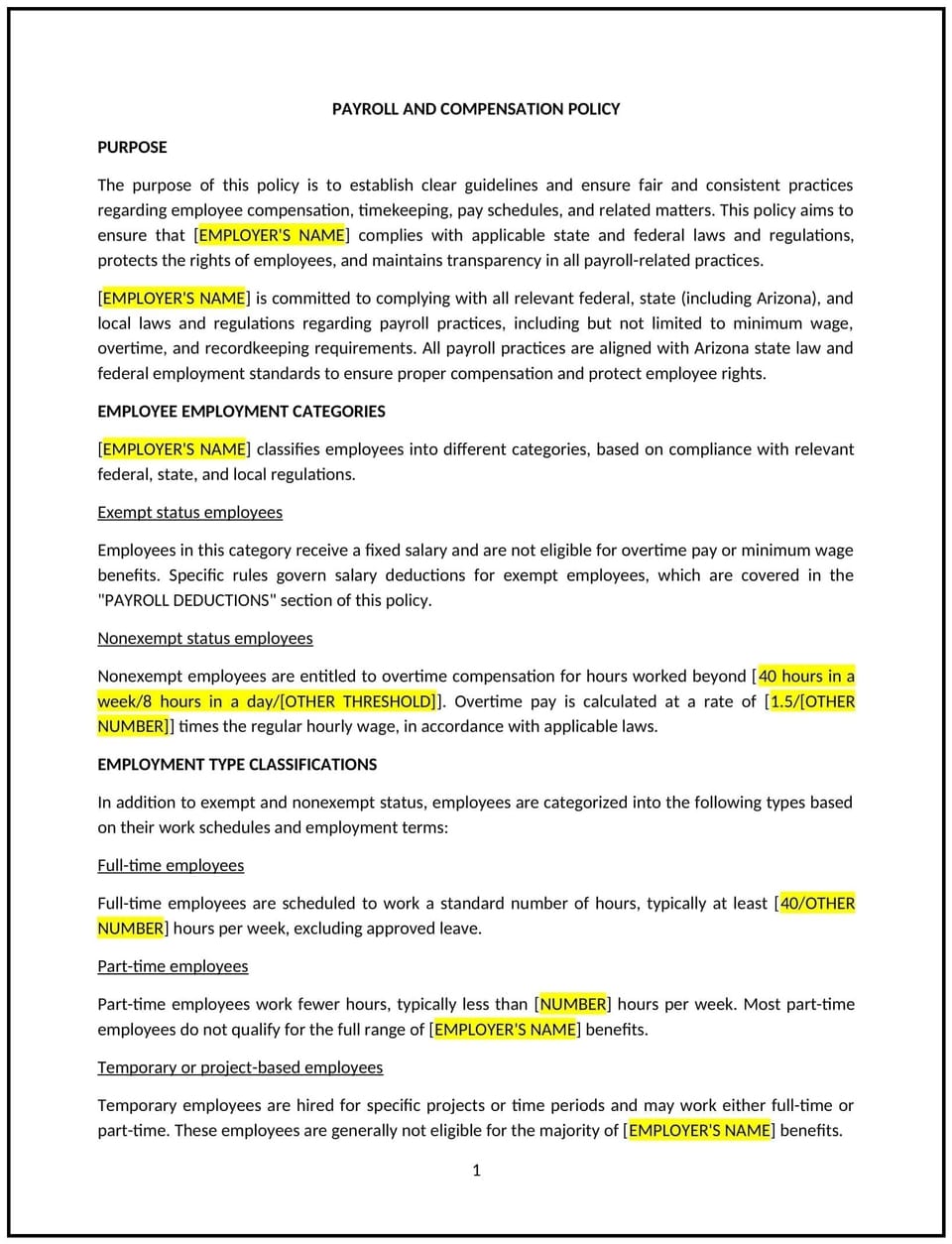Payroll and compensation policy (Arizona): Free template

Payroll and compensation policy (Arizona)
In Arizona, a payroll and compensation policy provides employees with clear guidelines on salary structures, payment schedules, and compliance with state and federal wage laws. This policy helps businesses ensure fair and consistent compensation practices while maintaining compliance with Arizona’s labor regulations.
This policy outlines pay structures, overtime procedures, deductions, and reporting requirements. By implementing this policy, Arizona businesses can enhance transparency, support employee satisfaction, and reduce legal risks.
How to use this payroll and compensation policy (Arizona)
- Define pay schedules: Specify payment frequency (e.g., weekly, bi-weekly) and the methods of payment, such as direct deposit or checks.
- Address wage calculations: Include guidelines for calculating regular wages, overtime pay, and commissions, ensuring compliance with Arizona’s minimum wage and overtime laws.
- Explain deductions: Detail permitted deductions, such as taxes, benefits, or garnishments, while ensuring compliance with state and federal laws.
- Include reporting procedures: Outline steps for employees to report payroll discrepancies or concerns.
- Emphasize compliance: Reaffirm the company’s adherence to Arizona wage laws and federal Fair Labor Standards Act (FLSA) requirements.
Benefits of using a payroll and compensation policy (Arizona)
This policy offers several advantages for Arizona businesses:
- Enhances transparency: Provides employees with clear information about pay structures, schedules, and calculations.
- Supports compliance: Aligns with Arizona and federal wage laws, reducing the risk of disputes or penalties.
- Increases trust: Demonstrates the company’s commitment to fair and consistent compensation practices.
- Improves efficiency: Standardizes payroll processes, minimizing errors and delays in payments.
- Protects the business: Establishes clear guidelines to address payroll concerns or disputes effectively.
Tips for using a payroll and compensation policy (Arizona)
- Address Arizona-specific considerations: Reflect state minimum wage laws, overtime regulations, and industry-specific compensation practices.
- Use technology: Leverage payroll systems to ensure accuracy and compliance in wage calculations and reporting.
- Train managers: Provide supervisors with training on payroll procedures and employee compensation concerns.
- Communicate updates: Notify employees promptly about changes to pay structures, schedules, or deductions.
- Regularly review: Update the policy to reflect changes in labor laws, business needs, or industry standards.
Q: How often are employees paid under this policy?
A: Employees are paid according to the company’s specified schedule, such as bi-weekly or semi-monthly, in compliance with Arizona labor laws.
Q: What deductions can be taken from an employee’s paycheck?
A: Permitted deductions include taxes, benefits contributions, and court-ordered garnishments, as outlined in state and federal regulations.
Q: How is overtime calculated under Arizona law?
A: Overtime is calculated at 1.5 times the regular hourly rate for hours worked over 40 in a workweek, following FLSA guidelines.
Q: What should employees do if they notice a payroll error?
A: Employees should report payroll discrepancies to HR or their supervisor immediately for investigation and resolution.
Q: How does this policy support compliance with Arizona laws?
A: The policy aligns with Arizona wage laws and federal standards to ensure fair pay practices and proper handling of employee compensation.
This article contains general legal information and does not contain legal advice. Cobrief is not a law firm or a substitute for an attorney or law firm. The law is complex and changes often. For legal advice, please ask a lawyer.


